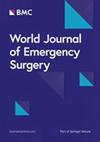多切口保留皮肤清创治疗肛周坏死性筋膜炎的回顾性研究
IF 5.8
1区 医学
Q1 EMERGENCY MEDICINE
引用次数: 0
摘要
多切口皮肤保留清创(MSISSD)是一种切除感染组织以达到源头控制的外科手术,同时保留了感染但可存活的皮肤,从而克服了传统手术清创的一些局限性。我们的目的是介绍这种皮肤保留清创技术治疗肛周坏死性筋膜炎(PNF),并回顾性分析其疗效和安全性。本回顾性分析纳入了2021年1月至2024年8月期间接受MSISSD治疗的PNF患者。我们调查了患者特征(性别、年龄、病程和LRINEC评分)和临床数据(合并症、重症监护病房住院时间[ICU LOS]、微生物培养结果、清创次数、住院时间[LOS]、伤口愈合时间、治疗结果和随访情况)。纳入22例PNF患者,其中男性19例(86%),女性3例(14%)。中位年龄、病程和LRINEC评分分别为59.5岁(范围:26-77)、4.5天(范围:2-10)和4天(范围:1-10),其中5例LRINEC评分≥6(23%)。在纳入的22例患者中,最常见的合并症是糖尿病,有9例(41%)。9例(41%)患者入住ICU, ICU的平均生存时间为2天。在伤口培养阳性的患者(14.64%)中,3例(21%)发现多微生物感染,11例(79%)发现单微生物感染。最常见的分离微生物是大肠杆菌(8.57%)和肺炎克雷伯菌(5.36%)。1例患者行2次清创,其余患者行1次清创。平均生存期为18天,创面愈合时间为61天。没有患者接受重建手术。在中位随访11个月期间,1例患者术后6个月出现肛瘘,经肛瘘切除术后恢复。无患者出现PNF复发或肛门失禁。MSISSD似乎是一种很有前途的有效的皮肤保护清创方法,它可以有效地保护皮肤,同时保证充足的引流,很少引起严重的肛门功能障碍。本文章由计算机程序翻译,如有差异,请以英文原文为准。
Multiple skip incision skin-sparing debridement for perianal necrotizing fasciitis: a retrospective study
Multiple skip incision skin-sparing debridement (MSISSD) is a surgical procedure that excises infected tissue to achieve source control while retaining the infected but viable skin, thus overcoming some limitations of traditional surgical debridement. We aimed to introduce this skin-sparing debridement technique for the treatment of perianal necrotizing fasciitis (PNF) and retrospectively analyze its efficacy and safety. Patients with PNF who received MSISSD between January 2021 and August 2024 were included in this retrospective analysis. We investigated the patient characteristics (sex, age, disease duration, and LRINEC score) and clinical data (comorbid diseases, length of stay in the intensive care unit [ICU LOS], microbiological culture results, number of debridements, length of stay [LOS], wound healing time, treatment outcomes, and follow-up status). Twenty-two patients with PNF were enrolled, including 19 males (86%) and three females (14%). The median age, disease duration, and LRINEC score was 59.5 years (range: 26–77), 4.5 days (range: 2–10), and 4 (range: 1–10), respectively, and five cases had a LRINEC score ≥ 6 (23%). Among the 22 patients included, the most common comorbid disease was diabetes, with nine cases (41%). Nine (41%) patients were admitted to the ICU, with a median ICU LOS of 2 days. Of the patients with positive wound cultures (14, 64%), polymicrobial infections were identified in 3 (21%) and monomicrobial infections in 11 (79%). The most commonly isolated microorganisms were Escherichia coli (8, 57%) and Klebsiella pneumoniae (5, 36%). One patient underwent debridement twice, while the remaining patients underwent debridement once. The median LOS was 18 days, and the wound healing time was 61 days. No patient underwent reconstruction surgery. During the median follow-up period of 11 months, one patient developed anal fistula 6 months after surgery and recovered after undergoing anal fistula resection. No patient experienced recurrence of PNF or anal incontinence. MSISSD appears to be a promising and effective method for skin protection debridement, which can effectively protect the skin while ensuring adequate drainage, and rarely causing severe anal dysfunction.
求助全文
通过发布文献求助,成功后即可免费获取论文全文。
去求助
来源期刊

World Journal of Emergency Surgery
EMERGENCY MEDICINE-SURGERY
CiteScore
14.50
自引率
5.00%
发文量
60
审稿时长
10 weeks
期刊介绍:
The World Journal of Emergency Surgery is an open access, peer-reviewed journal covering all facets of clinical and basic research in traumatic and non-traumatic emergency surgery and related fields. Topics include emergency surgery, acute care surgery, trauma surgery, intensive care, trauma management, and resuscitation, among others.
 求助内容:
求助内容: 应助结果提醒方式:
应助结果提醒方式:


